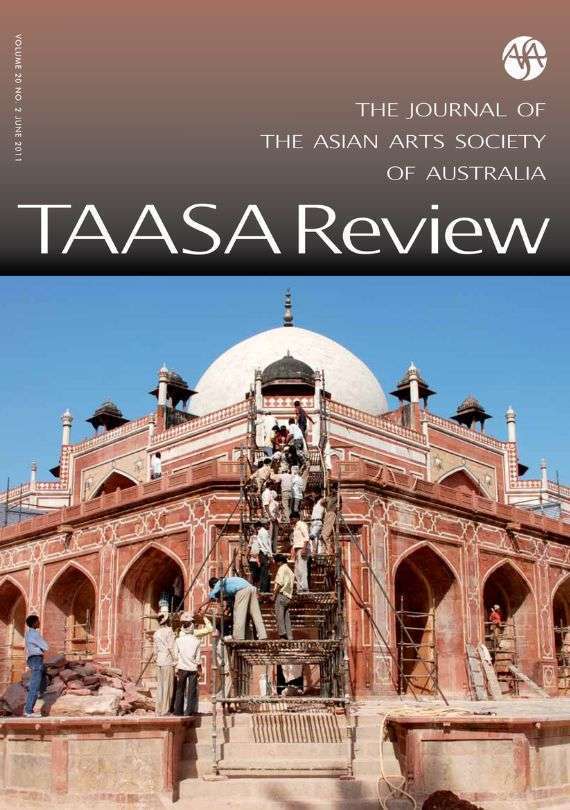TAASA Review Issues
June 2011
Vol: 20 Issue: 2
Editor: Josefa Green
Cover Image
Humayun’s Tomb, Delhi, traditional ramp constructed to repair dome. Courtesy: Aga Khan trust for culture. See pp10-11 of this issue.
TAASA Members may log in to download a PDF copy of this issue as well as past TAASA Review issues back to 1992.

Editorial
This a truly eclectic issue, with something for everyone.
In our opening article on the art of Chinese papercutting, Liwanna Chan describes how this traditional folk art was co-opted in the 1940s into the service of the communist revolution, and how it continues to play a pivotal role in contemporary Chinese art. The transformation of traditional art forms and materials – in this case traditional textile practices in Indonesia – into vibrant contemporary art practice is also the theme of Eloise Baldwin’s review of Fiber Face 3, an Indonesian international fibre art exhibition held in Yogyakarta in February 2011.
Indonesia is again represented in the profile of artist, priest and healer Ketut Liyer, prominantly featured in the best selling book and subsequent film Eat Pray Love. Based on his own collection and drawing on his long term engagement with Balinese art, Chris Hill focuses in this article on Ketut Liyer’s life as a professional painter. Remaining in Southeast Asia, Alexandra Green, Curator of South and Southeast Asian Art at the AGNSW, introduces us to the colourful Burmese Buddhist wall paintings, dating from the late 16th to the 19th century, which can be found in small scale temple sites around the confluence of the Chindwin and Irrawaddy Rivers in central Burma.
We turn our attention to architecture in Professor Narayani Gupta’s lively account of the restoration work currently underway on Emperor Humayun’s tomb and surrounding gardens and district in the heart of Delhi. A project of the Aga Khan Trust for Culture, this is an inspirational project which is involving the local community as well as restoring, not just a splendid monument, but an entire historical precinct. India’s artistic heritage is also represented in our regular In the Public Domain feature by NGV Curator Carol Cains’ account of a lovely 19th century South Indian Deity album acquired by the NGV in 2009.
The TAASA Review regularly features exhibitions and collections which are available to Asian art enthusiasts. A major installation by the renowned Vietnamese artist Dinh Q Le, inspired by the recent Christmas Island asylum seeker tragedy, will be shown at the Sherman Contemporary Art Foundation in Sydney from 8 July. Journalist and author Michael Young previews this multi media installation in the context of Dinh Q Le’s life and works. We also feature a relative newcomer to the Sydney Asian art scene: Chinalink gallery. As art journalist Zhou Mingyue points out, Chinalink aims to promote contemporary Chinese art from a Chinese perspective, giving a voice to Chinese artists now living in Australia. Its next solo exhibition, Shen Kang’s Tibetan Hymns, opens on 23 June.
We are also pleased to feature a major exhibition Beneath the Winds scheduled for November this year at the Art Gallery of South Australia. This is a comprehensive survey of AGSA’s Southeast Asian permanent collection and will coincide with the launch of a collection publication authored by James Bennett, Curator of Asian Art. Curatorial Assistant Russell Kelty gives us a tantalising preview of the riches which this exhibition will offer.
On a different note, we sadly honour the passing this year of the great potter, Shiga Shigeo, with a brief but insightful review of his life and works by John Freeland, academic and collector of Australian and Japanese studio ceramics. A fine selection of Shiga’s work is currently on view at the AGNSW.
We also take the opportunity to farewell TAASA life member Rosemarie Dowe in an obituary kindly provided by TAASA members Peter and Prue Webb.
Two more items in this issue which will interest readers should finally be mentioned here: an enthusiastic review of the Patan Museum in the Kathmandu Valley, Nepal in Traveller’s Choice by art historian Ann Proctor and a review of Hwei-Fe’n Cheah’s exquisite new book Phoenix Rising on Nyonya beadwork by Dr Marianne Hulsbosch from the University of Sydney.
Table of contents
3 Editorial – Josefa Green
4 Art And Politics: Traditional Chinese Paper Cut – Liwanna Chan
7 Earning Merit: Burmese Temple Wall Paintings – Alexandra Green
10 Restoring Humayun’s Tomb: An Initiative Of The Aga Khan Development Network – Narayani Gupta
12 Ketut Liyer: Balinese Artist, Priest and Healer – Chris Hill
15 In Conversation With Vietnamese Artist Dinh Q Le – Michael Young
17 Fiber Face 3: Transforming Indonesian Contemporary Visual Arts – Eloise Baldwin
19 Beneath The Winds: An Exhibition At AGSA – Russell Kelty
21 Shiga Shigeo (1928 – 2011) – John Freeland
23 Chinalink Gallery: An Alternative Perspective – Zhou Mingyue
24 In the Public Domain: A Nineteenth Century South Indian Deity Album at the NGV
Carol Cains
26 Traveller’s Choice: Patan Museum, Nepal – Ann Proctor
27 Book Review: Phoenix Rising: Narratives In Nyonya Bead work From The Straits Settlement – Marianne Hulsbosch
28 Farewell to Rosemarie Dowe – Peter and Prue Webb
29 Recent TAASA Activities
29 TAASA Members’ Diary: June – August 2011
30 What’s On: June – August 2011 – Compiled by Tina Burge
BECOME A MEMBER
To download a PDF copy of this issue as well as past TAASA Review issues, receive discounted entry to industry events and participate in exclusive study groups, join the TAASA Community today.
TAASA Review Issues
2025
2024
2023
2022
2021
2020
2019
2018
2017
2016
2015
2014
2013
2012
2011
2010
2009
2008
2007
2006
2005
2004
2003
2002
2001
2000
1999
1998
1996
1995
1994
1993
1992
TAASA Review Issues
2025
2024
2023
2022
2021
2020
2019
2018
2017
2016
2015
2014
2013
2012
2011
2010
2009
2008
2007
2006
2005
2004
2003
2002
2001
2000
1999
1998
1996
1995
1994
1993
1992